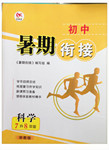题目内容
--- You look so young. Haven’t you graduated from your university?
--- Yes, I _______ in the English Department of Zhejiang Normal University for four years.
A. was studying B. study
C. had studied D. studied
D
【解析】
试题分析:考察一般过去式。根据后者的回来来看,“我”已经毕业了,所以学四年英语应该是说的过去的事情。一般过去式只是叙述过去的一件事情,与现在无关,它可以和一段时间连用。该对话意思为:---你看起来好年轻,从大学里毕业了么?---是的,我在浙江大学的外语系上了四年学。故选D
考点:考察一般过去式。

练习册系列答案
 鹰派教辅衔接教材河北教育出版社系列答案
鹰派教辅衔接教材河北教育出版社系列答案 初中暑期衔接系列答案
初中暑期衔接系列答案
相关题目